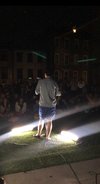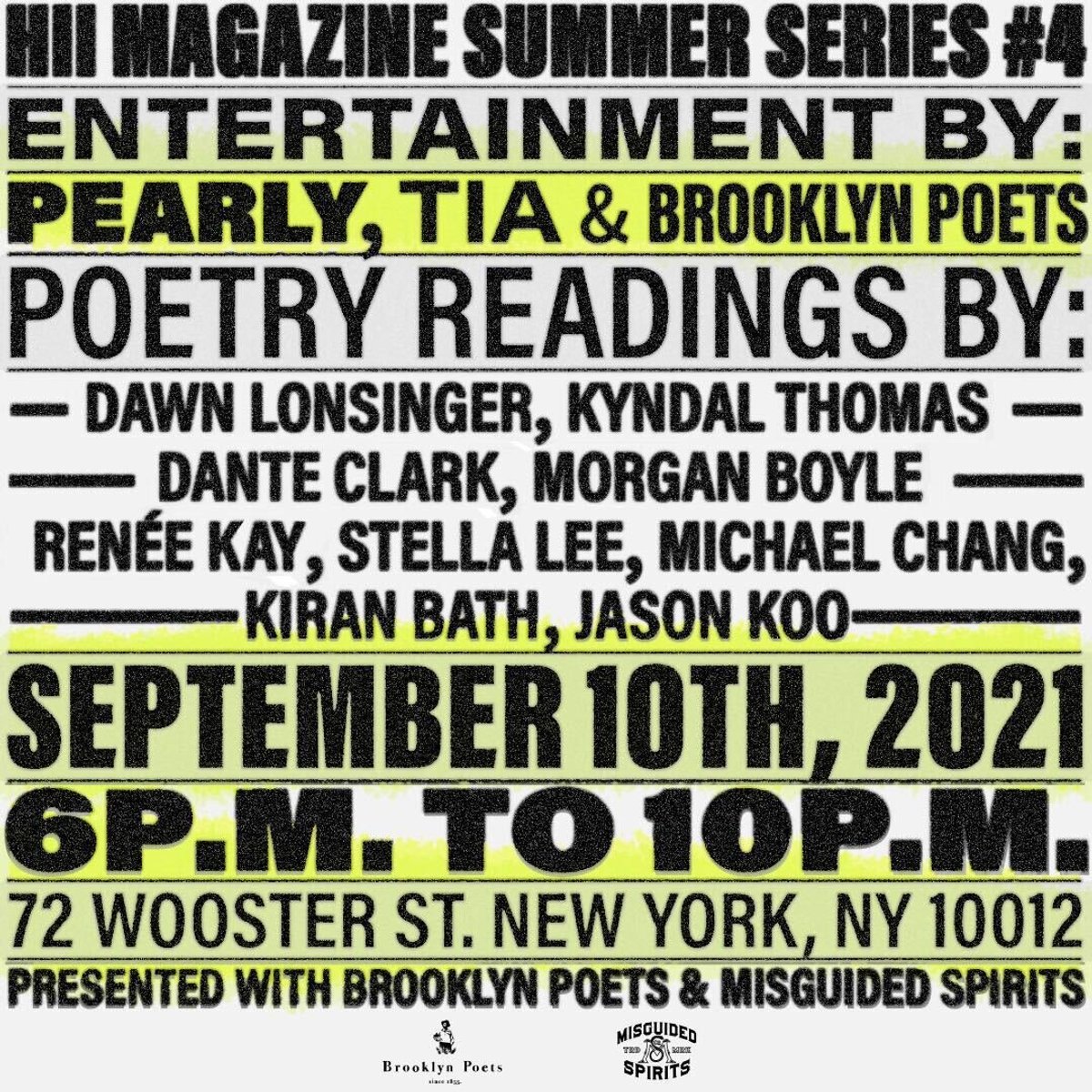






Rand Faris examines what the sound of poetry performed is, recalling her own initiation into poetry and the history of poetry leading up to the ‘Spoken Word’ style.
Whispers, glasses clinking subtly and sporadically, snaps and (if encouraged) stomps, fill the room. Dimmed lights set the tone for the night - intimacy is the only Hors d’oeuvre the menu offers. You come seeking the potential of connection. You want to be moved. You want to be heard as you listen - for when one finds themself in another's words, they are heard just the same.

(Image from Hii’s Poetry Reading Event on September 10th, 2021. Poet Michael Chang.)
I was 19 when I performed my first spoken word poem. Encouraged to ‘just give it a go’ by a friend, I stood directly across from a huddled up audience of cool college kids staring back at me in anticipation. Prior to that age, my poetry consisted of rhyming love letters dedicated to the high-school boys I borne distant crushes on. These poems were not meant to be heard, and so they lived on the yellowing pages of my notebooks. In college, a good friend of mine started an open mic night, at a small bar, situated along the River Of Thames in Kingston, London, called ‘Word Of Mouth’. It gained, what felt like, instant popularity and drew a community of artists: rappers, poets, stand up comedians, actors, and dancers, who gathered under one roof, winter through summer, to find themselves in other people. At the time, I had never studied or researched any poets and their work, nor could I even list 5 poets I was fond of... All I had to offer this crowd of artistic adolescents, was a compilation of truthful words, formed into sentences, that I wrote in lieu of infamously brushing off surfaced feelings.

(Words of Mouth (via Rand Faris))
Words of Mouth quickly became my (bi-weekly) ritual. I found myself writing poems I couldn’t wait to perform - I was instilled with a reason to write and given a place to express myself beyond the confines of a disposable notebook. Almost always, without fail, the experience of performing was exceedingly liberating, and almost always, without fail, it was profoundly humbling as I performed parallel to poets gifted far beyond my comprehension. But then, there were nights where someone would tap my shoulder, or cross over from one end of the room to my end, just to thank me. The nights where, someone would approach me just as I was stepping off stage to say ‘you just articulated exactly how I feel’. It was those instances when someone would find themself within my expression, tangled in-between my breaths and my stutters, gliding through my metaphors, that kept me coming. That was the reason I kept speaking up when I had something to say, and the very reason I just went to listen when I didn't. For I knew, in the absence of my own words, I’d find myself in another’s.
Spoken word above all else is a conversation. The audience is pivotal - the expression must be received or else it loses meaning. As T.S Elliot declared "poetry remains one person talking to another". The Poetry Foundation describes Spoken Word as “A broad designation for poetry intended for performance” furthermore, “Characterized by rhyme, repetition, improvisation, and word play, spoken word poems frequently refer to issues of social justice, politics, race, and community.” It focuses on the art of recitation and the performers aesthetic qualities, such as their cadence and intonation. The apparent difference between Spoken Word poetry and poetry on the page is the performative aspect. Spoken word has existed long before written poetry and published press. It is said to originate from African tribes, as mentioned by Ruth Finnegan in Oral Literature in Africa, as well as in Ancient Greece. Spoken word then, lived in the form of theatrics - a popular medium for storytelling about culture, politics, education, spirituality and of course, entertainment.
Spoken Word poetry first surfaced in America during the 1920’s. The great Migration of African Americans from South to North attracted many greats to Harlem, propelling the ‘Harlem Renaissance', a heavily influential literary movement, into formation. Its community celebrated and embraced it’s African heritage, breaking and overcoming societal stereotypes placed upon them through self-expression.

Harlem Renaissance (Source)
Soon after, in the late 1940’s and 50’s, John Kerouac and Allen Ginsberg, pioneered a movement titled ‘The Beat Generation’. This movement began post-World War 2, in response to materialism ideals rising and the economic boom surfacing. The Harlem Renaissance, The Beat Generation, and soon after, BAM (The Black Arts Movement), were movements birthed in reaction to societal changes, disruptions, and ideologies that did not apply to all members of society equally - An outlet for expression, processing, mourning, and changing the narrative was essential. Then, sometime during the 1980’s, in Chicago, Illinois, a man named Marc Kelly Smith founded the concept of Slam Poetry, in an attempt to resurrect a love and appreciation for poetry, freeing it from it’s academic chains. To put it simply, Slam Poetry is Spoken Word poetry in competition. There are rules to follow, chosen judges, and rounds of elimination.

Marc Kelly Smith (Source)

Allen Ginsberg (Source)
When exploring Spoken Word in relation to music, there are apparent commonalities. Musical performances also require an audience, however, they do not rely on one in the same manner. I have been to gigs where I involuntarily rubbed sweaty shoulders with the person next to me, and I’ve been to gigs where I had the luxury of flailing my arms unconcernedly around a vacant room. ‘The show must go on’ in regards to a musical performance, crowd or no crowd, because music transcends the stage.
A Spoken word performance demands a certain place and time to be heard. It requires respect and patience. No one speaks over a Spoken Word performance, but you can speak over music - This is not out of disrespect to the musicians, but by nature a musical performance is loud enough to be spoken over. Furthermore, lyrics are not always the dominant force in a song, as opposed to Spoken word. Most times, the words are the only component. In some instances, music is incorporated in Spoken word, but it is the words themselves that form the rhythm. The poet is the instrument, and so consequently, there is less concern with fitting their words onto the rhythm of the music.
We have grown accustomed to hearing music anywhere, everywhere, and whenever we please. When we listen to music we choose when to tune in and allow the music to move us, or when to tune out and allow it to play in the background. It’s part of our everyday lives- walking into the store, an elevator, on the radio, at home, in a movie etc. We have our own relationship to music to fall back on - what it means to us and how we enjoy it. Spoken word feels more sacred, only heard in specific spaces with intent, like Sunday service at church.
When you listen to poetry, you will either relate to/be moved by what is being uttered aloud, or you simply may not. The advantage Spoken Word poetry has over written poetry is it’s dependency on phonaesthetics - a study that examines how certain sound combinations carry their own meaning. Performers manipulate, contract, extract, induce and distill an emotion through the power of phonaesthetics. Euphony (a pleasing/enjoyable sound) for example, can easily convey a feeling of serenity more than reading the same metaphor off a page, or the cacophony (a harsh sound) a poet uses when speaking of heartbreak, can induce a stronger feeling of pain than simply reading about it. The emphasis on particular words, the tone, pace, movements etc. are all tools that bring an experience to life. They facilitate the metamorphosis of a peculiar idea, into a free-for-all interpretation, ergo birthing a new reality.
The word ‘pain’ pronounced as a whisper, has a different effect than pronounced as a shout. The whisper could mean that the pain they are experiencing is exhausting, whereas the shout could mean the pain they are experiencing is enraging. A sped up verse could be used to portray chaos or perhaps excitement, whereas a slowed down verse could portray melancholy or even unfiltered joy that distills a moment to only that - pure joy, where nothing else matters.

(Image from Hii’s Poetry Reading Event on September 9th, 2021. Poet Jason Koo. )
The power of word play and performance is exemplified by Neil Hilborn, in his poem titled ‘OCD’.
Hilborn uses repetition to present his OCD-
“I’d always watch her mouth when she talked —
when she talked —
when she talked —
when she talked
when she talked”
He speeds up the pace and gets louder when he’s experiencing his OCD. This helps the audience understand the gravity of it. How his obsessive compulsive disorder is overpowering, infiltrating his everyday life. However, when he mentions the woman he’s fallen in-love with, he slows down and quiets his voice. We witness his symptoms turn from chronic to manageable, when he talks about her:
“The first time I saw her…
Everything in my head went quiet.
All the tics, all the constantly refreshing images just disappeared.”
Through his performance, Hilborn takes the audience on a heartbreaking journey of living with a mental health disorder, finding love, then losing that love due to the severity of his disorder. He ends the poem on a bittersweet note, uncovering a truth both to himself and the listeners - falling in-love cured his OCD:`
“I want her back so bad…
I leave the door unlocked.
I leave the lights on.”
As my memories from the last decade step over one another, merging themselves into a series of indistinct images, one thing I concretely gather is, I owe a big chunk of my ever growing relationship with Spoken word poetry to Word Of Mouth. I learnt how to express myself and listen simultaneously. How self-expression can be a conversation rather than just a self involved act. When a story lives on a page, it’s the reader's choice to find life within it, however, when a story lives aloud, life already pulsates through it, and it is the audience’s choice to simply listen for it.

(Rand Faris)
Poetry does not have a particular sound. That’s the beauty of it. Its sound is elastic and very personal to the reader - just as a cover of a song, to the original version. As poet Robert Pinsky quotes, “whoever reads a poem aloud becomes the proper medium for the poem”. No one will read a poem the same because words will hold different meanings to each individual. Our life experiences transform us from people to a person - they constitute our individuality. We all possess different opinions and beliefs that stem from the life experiences we have lived through. In Spoken Word people come together to understand one another, to broaden their perspectives, to share beliefs or question their own.

Flier from Hii Mag’s Poetry Reading Event

